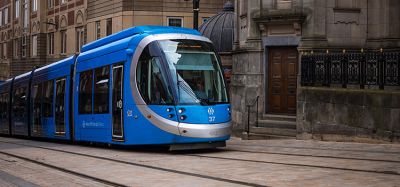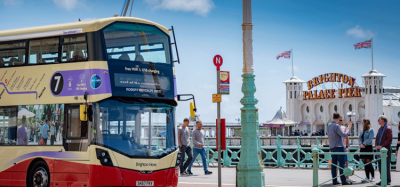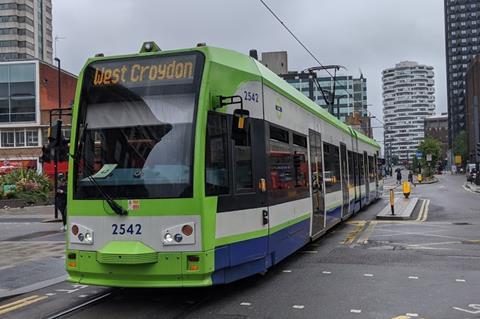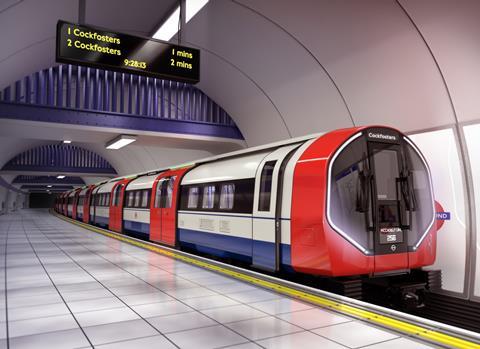
Friday 13 Dec 2019

TfL Press Release - TfL Business Plan: investing to keep London moving

- Five-year plan means continued investment to encourage greater use of public transport, walking and cycling and significantly improving the environment and air quality
- Firm financial management keeps TfL on track to deliver an operating surplus by 2022/23 with net annual cost of operations reduced by more than £1bn since 2015/16
- Delay to the opening of the Elizabeth line and a subdued economy means a cautious approach necessary to revenue forecasts
- Sustained Government funding needed to support the safe and reliable operation of the current transport network and to accommodate the city’s growth
Transport for London (TfL) has today published its draft five-year Business Plan covering the period from 2020/21 to 2024/25.
Alongside the Mayor's Transport Strategy, the draft plan will be considered by TfL’s Finance Committee on 18 December. It sets out how transport will support sustainable growth, making the city a safer, greener and better place to live, work and visit.
Despite continued uncertainty in the economy, the plan shows very strong progress in reducing the net cost of TfL’s operations. However, it is essential for there to be long-term certainty around Government investment in existing and new transport assets to ensure that services support the growing city. TfL’s finances continue to be subject to substantial pressures as a result of the average £700m a year reduction in Government funding for its day-to-day operations.

While passenger numbers on public transport have been slightly higher overall compared to last year, recent weeks have seen a notable softening in demand which could be linked to wider economic uncertainty. This affects long-term passenger trends and commercial income, meaning that revenue forecasts must remain cautious across the plan period.
Since last year’s plan, Crossrail Limited has confirmed on 8 November 2019 that it needs further time to complete software development for the railway’s signalling and train systems and for overall safety approvals on the line. As a result, the opening of the central section of the Elizabeth line will not occur in 2020 but will be as soon as practically possible in 2021. This has created significant additional capital investment and revenue pressures.
As announced at its Board meeting in November, between £500m and £750m in lost revenue needs to be absorbed in addition to the £600m highlighted in last year’s plan. This revenue shortfall is spread across the next four financial years and will be managed through further savings and by encouraging more people to use public transport.
TfL has gripped its costs, both in its own operations and through the supply chain. This has reduced the net annual cost of operations by more than £1bn since 2015/16, while a range of improvements have continued to be delivered.

In the last year alone, the world-leading Ultra Low Emission Zone (ULEZ) was introduced in central London, peak-hour services were extended on the Victoria line and train frequencies increased on some London Overground lines. These improvements are contributing to operating income being forecast to be almost £6bn in 2019/20, with passenger numbers expected to reach a record 4.37bn journeys a year by the end of the plan period.
TfL remains on track to generate an operating surplus by 2022/23, meaning that it will cover the cost of financing, maintaining, operating and renewing its transport network. This will help ensure it can manage debt and reduce borrowing levels. Throughout the plan period, significant investment will continue providing better, more frequent and accessible transport options. This investment includes:
- Completing the signalling upgrade and increasing capacity by 33 per cent on the Circle, Hammersmith & City, Metropolitan and District lines, delivering refurbished trains on the Central line and new, spacious state-of-the-art trains on the Piccadilly line. TfL will also continue to make the case for Government investment to replace the life-expired signalling system on the Piccadilly line, which it had to pause last year owing to a lack of certainty around Government funding. It remains TfL’s intention to press ahead with this essential work as soon as funding is confirmed.
- Continuing the electrification of London buses, already the largest electric fleet in Europe, with more than 2,000 zero-emission buses by end of 2024/25. TfL will also work with bus operators to implement its world-leading Bus Safety Standard, including all new buses purchased from August 2019 having Intelligent Speed Assistance as standard.
- Reducing TfL’s environmental impact through installing new solar panels on selected London Underground, DLR and tram depots to deliver more than 1.1 megawatts of power, and the continued retrofitting of lighting across the network to energy-efficient LEDs. TfL will also be increasing the amount of low-carbon energy supplied to its infrastructure which comes from renewable energy sources with an aim for its rail services to be 100 per cent carbon-free by 2030.
- Maintaining and upgrading existing core assets across the transport network to provide safe and reliable journeys. This includes replacing rails to offer customers a smoother, quieter ride, and maintaining lifts and escalators. New walk-through trains on the DLR will be delivered, increasing capacity on the lines and providing more frequent, direct services. Following a two-year pause, proactive renewal of roads and paving will also recommence with a focus on improving the experience for those walking, cycling or taking public transport.
- Supporting Crossrail Limited in the remaining and complex technical work necessary to allow the Elizabeth line to open. From Sunday 15 December this year, TfL Rail will begin running services to Reading from Paddington, with direct services between Heathrow from Paddington beginning in spring 2020. Construction continues around the clock in stations and tunnels on the rest of the Elizabeth line, with safety-critical systems now being installed and tested. The central section of the Elizabeth line will in 2020 undergo extensive trial running and testing to ensure it is safe and reliable and will open as soon as practically possible in 2021.
- Helping further to clean up London’s toxic air by tightening the Low Emission Zone standards in October 2020 and, in October 2021, expanding the successful central London ULEZ - the toughest air quality standard of any city in the world - to cover the area within the North and South Circular Roads.
- Working with boroughs, investing in new high-quality cycle routes across London and working with local communities to improve high streets, making them safer and accessible to everyone. Delivering these schemes forms part of TfL’s commitment to Vision Zero, which aims to eliminate death and serious injury from London’s roads by 2041.
- Delivering 10,000 homes and two million sq. ft of commercial floor space across London, with 50 per cent of the homes being affordable.
- Introducing new services on the Northern line extension to Battersea and the Barking Riverside extension on the London Overground.
TfL will also continue to make the case for future transport infrastructure to support the growth of London and support the wider South East region and the UK overall, such as Crossrail 2 and the Bakerloo line extension. Delivering these schemes would unlock hundreds of thousands of new homes and lead to cleaner air, better health, a more prosperous economy and real progress towards carbon neutrality, as well as better transport links.

While London has benefited from additional third-party funding for transport projects, such as being successful in bids from the Government’s Housing Infrastructure Fund, TfL did not see any commitment in the 2019 Government spending round. This is now materially limiting long-term investment in the transport network.
Following the General Election, the Mayor and London’s Transport Commissioner will be writing to the new Government to press the need to confirm the steady and sustained funding London needs to the benefit of the UK as a whole.
Mayor of London, Sadiq Khan, said: “I am hugely proud of what we have achieved improving transport across London – this is despite the ongoing economic uncertainty and the average reduction of £700m per year in TfL's funding from central Government. Alongside our continuing modernisation of the Tube, TfL fares will be frozen again this January, and we continue to take some of the boldest action of any city in the world greening up our transport network and improving air quality across the capital.
“But London also needs a Government that recognises the importance of continued investment in new infrastructure for the future of our economy, and it is essential the new Government commits to working with us to deliver vital projects such as Crossrail 2 and the Bakerloo Line extension.”
London’s Transport Commissioner, Mike Brown MVO, said: “Since our formation in 2000, there has been enormous commitment and sustained investment to revitalise our transport network, supporting our city’s economic growth. In this time of uncertainty, this Business Plan is focused on running safe and reliable services while investing to improve travel. But cities can only thrive if they benefit from steady, sustained funding in existing and new infrastructure. We are working urgently to secure this, and I will be writing to the Government to seek this investment to keep London and the country moving.”
A copy of the draft TfL Business Plan will be available to download here: https://tfl.gov.uk/corporate/publications-and-reports/finance-committee
Contact Information
TfL Press Office Transport for London 0343 222 4141 [email protected]
Notes to editors
In November 2019, the TfL Board approved revised targets for 2019/20, which more closely aligned to the Quarter 2 forecasts for TfL’s year-end position. These new targets have been reflected in the Business Plan and mean that TfL’s net cost of operations is now forecast to be £434m better than those previously forecast in its annual budget.

TfL Image - Installation of 4G technology at Canada Water station

TfL Image - Electric Taxi

TfL Image - Bank Escalator bank under construction

TfL Image - Tower Bridge Road CS4

TfL Image - Electric Bus

Powered by Onclusive PR Manager © 2024
Recommended

About us | Advertise with us | Contact us
TfL’s new draft Business Plan to support London’s economic recovery
- Odnoklassniki
- Facebook Messenger
- LiveJournal
Posted: 5 December 2022 | Intelligent Transport | No comments yet
In addition to setting out its path to financial sustainability, TfL’s latest Business Plan will focus on delivering key improvements across London’s road and rail network, while achieving its climate action targets.

Credit: Transport for London
Transport for London (TfL) has announced that it has published its latest Business Plan, setting out how it will support London’s economic recovery and become more sustainable whilst achieving operational financial sustainability by 2023/24.
Across the plan, £8.1 billion will be invested in London’s road and rail network, as well as funding to boroughs provided for investment in their streets. The total investment in safe and active travel, across both operating and capital expenditure, will average £150 million per year across the Business Plan. This will allow further delivery of the capital’s strategic cycle routes, as well as the delivery of new cycleways and safer junctions to make London’s major roads safer and more attractive for those walking and cycling.
Furthermore, the plan will see the delivery of the London-wide Ultra Low Emission Zone (ULEZ) to further tackle the triple challenges of air pollution, the climate emergency and congestion. This will be supported by a £110 million scrappage scheme, as well as the expansion of outer London’s bus network.
The plan will also see TfL become the ‘green heartbeat’ for London, supporting the Mayor’s ambition for a net zero-carbon city by 2030 . Additional funding has been allocated to embed action on environment in TfL’s work, including to cut and adapt to the impacts of climate change on London’s public transport network. The plan also keeps the pathway open to London’s bus fleet transitioning to zero-emission by 2030.
In order to encourage customers back, TfL will also be investing in its infrastructure to keep services safe, clean and reliable, as well as delivering a range of improvements to London’s Tube, bus and rail network. This includes investment in the development of new trains to replace the ageing Piccadilly line fleet and a new fleet for the Docklands Light Railway.
As part of this, new signalling on the Circle line has now been delivered, and TfL will complete the remainder of the Four Lines Modernisation programme – delivering more frequent, reliable and faster journeys to the District, Hammersmith & City and Metropolitan lines. The project to modernise and expand Bank station will also be completed, transforming customer journeys at the heart of the city.
TfL’s new data shows continued rise in walking and cycling across London
The plan prioritises projects that will be financially viable within three to five years, and includes energy efficiency projects, which will further reduce TfL’s operating costs and contribute to meeting London’s environmental goals. TfL will also continue the work of becoming a more diverse and inclusive organisation and one that invests in staff welfare and facilities to ensure that it remains an attractive place to work.
Investing in new trains and signalling will create jobs and investment across the UK and help to grow the wider UK economy. To do this, long-term certainty on Government funding is needed past the current funding agreement to April 2024.
“Following tough negotiations and my commitment to prioritise funding for London’s vital public transport, TfL is on track for financial stability, ridership across the network is increasing and there have been major improvements to the capital’s public transport network,” said the Mayor of London, Sadiq Khan. “It is clear there are many challenges ahead, but TfL’s Business Plan sets out how London’s world-class public transport network will continue to contribute to a better, greener and fairer city for all Londoners.”
London’s Transport Commissioner, Andy Lord, said: “This plan shows how we will work to achieve our vision of being the green heartbeat of London, and how we will continue on the path to financial sustainability whilst delivering real and vital improvements for the city. It will deliver new trains for the DLR and the Piccadilly line, new cycleways, the new Thames crossing at Silvertown, safer junctions, an expanded Ultra Low Emission Zone and a new expansion of the bus network in outer London to support growth.”
In this Business Plan , TfL’s savings target is increasing to a total of £1 billion recurring savings, meaning a further £600 million per year needs to be delivered by 2025/26. This will be delivered through a focus on improving efficiencies, driving improvements where possible for TfL colleagues, and an approach to continuous savings, including working together with TfL’s supply chain to make further efficiencies.
The draft TfL Business Plan will be considered by the TfL Board on 7 December 2022.
If you liked this, you may also be interested in:
▶ TfL launches new challenge to find ways of making roads safer and more efficient
▶ Mayor of London’s plan to accelerate capital’s transition to electric vehicles
Related topics Air Quality , Alternative Power , Fleet Management & Maintenance , Mobility Services , Passenger Experience , Public Transport , Sustainable Urban Transport , Workforce Inclusivity , Workplace
Related modes Bus & Coach , Rail
Related cities London
Related countries United Kingdom
Related organisations Transport for London (TfL) , UK Government
Related people Andy Lord , Sadiq Khan

Navigating success and challenges: A deep dive into Demand-Responsive Transport operations

First Bus to become UK’s largest bus operator to adopt Real Living Wage
By Intelligent Transport

West Midlands Metro introduces extra trams to meet surging customer demand

Navigating the short‑ and long-term strategies to ensure an enhanced customer experience
By Mark Anderson - The Go-Ahead Group


Voi Technology launches next-generation e-bikes in Liverpool
Leave a reply cancel reply.
Your email address will not be published. Required fields are marked *
This site uses Akismet to reduce spam. Learn how your comment data is processed .
© Russell Publishing Limited , 2010-2024. All rights reserved. Terms & Conditions | Privacy Policy | Cookie Policy
Website design and development by e-Motive Media Limited .

Privacy Overview
This website uses cookies to improve your experience while you navigate through the website. Out of these cookies, the cookies that are categorised as "Necessary" are stored on your browser as they are as essential for the working of basic functionalities of the website. For our other types of cookies "Advertising & Targeting", "Analytics" and "Performance", these help us analyse and understand how you use this website. These cookies will be stored in your browser only with your consent. You also have the option to opt-out of these different types of cookies. But opting out of some of these cookies may have an effect on your browsing experience. You can adjust the available sliders to 'Enabled' or 'Disabled', then click 'Save and Accept'. View our Cookie Policy page.
Necessary cookies are absolutely essential for the website to function properly. This category only includes cookies that ensures basic functionalities and security features of the website. These cookies do not store any personal information.
Performance cookies are includes cookies that deliver enhanced functionalities of the website, such as caching. These cookies do not store any personal information.
Analytics cookies collect information about your use of the content, and in combination with previously collected information, are used to measure, understand, and report on your usage of this website.
Advertising and targeting cookies help us provide our visitors with relevant ads and marketing campaigns.
Your browser is not supported
Sorry but it looks as if your browser is out of date. To get the best experience using our site we recommend that you upgrade or switch browsers.
Find a solution
- Skip to main content
- Skip to navigation

- Back to parent navigation item
- Projects & planning
- Policy & Strategy
- Technology, Data & Business
- Infrastructure
- Operations & Services
- Light Rail & Tram
- Suburban & Commuter Rail
- Peoplemovers & Monorails
- Buses & Road Vehicles
- Middle East & Africa
- Maps & Data
- Digital Magazines
- Tenders & Jobs
- Sponsored Content
- White Papers
- More from navigation items
Replacement trams and Underground trains in Transport for London draft business plan
By Metro Report International 2022-12-07T12:21:00+00:00

UK: Transport for London has published its draft business plan for the period from April 2023 until April 2026.
This covers the scheduled delivery of new Siemens Mobility Piccadilly Line and CAF Docklands Light Railway trains, and completion of the Four Lines Modernisation programme on London Underground’s Circle, District, Hammersmith & City and Metropolitan lines.

Subject to securing long-term government capital funding, TfL’s plans include the procurement of replacement vehicles for London Trams, new metro trains for the Bakerloo Line and resignalling the Bakerloo and Piccadilly lines.
A pipeline for accessibility works is being developed, and TfL will continue to seek third party funding for implementation.
TfL says it is ‘supporting the Department for Transport to assess the case for driverless trains’.
The business plan prioritises projects that will be financially viable within three to five years, including energy efficiency schemes which would reduce operating costs and contribute to meeting environmental goals.
Feasibility studies for the proposed DLR extension to Thamesmead, Bakerloo Line Extension, West London Orbital railway and Crossrail 2 will continue ‘where appropriate’, but any network extensions would depend on securing additional funding as the significant capital requirement is not affordable from operating revenue.
TfL is working with DfT to safeguard the route for Crossrail 2.
TfL says the funding arrangements now in place with the government and the Greater London Authority give it financial certainty until March 31 2024, and ridership on Underground, bus and rail services is now at around 80% of pre-pandemic levels.
However, long-term certainty on government funding is needed past April 2024.
TfL said ‘like every other major transport authority around the world’ it will need ongoing government support for capital investment, and discussions with the government on shared priorities for future capital investment have already commenced.
Business Plan 2022/23 to 2025/26
- London Trams
- London Underground
- Transport for London
- Urban transport policy
Related articles

London Underground train refurbishment underway
2023-12-18T05:00:00Z By Metro Report International
UK: Work has been completed on the first trainset to be overhauled as part of London Underground’s £500m Central Line Improvement Programme. TfL is working with more than 30 suppliers on the project, which is being undertaken at Acton depot by more than 125 fitters and ...

Funding uncertainty puts London Underground’s Piccadilly and Bakerloo modernisation plans at risk
2023-11-22T13:02:00Z By Metro Report International
UK: Securing £500m of government grant funding to pay for major projects in 2024-25 is critical for the future of the London Underground, according to Transport for London Chief Capital Officer Stuart Harvey. Speaking in Germany when the first of 94 new Piccadilly Line trains ...

London Underground's Piccadilly Line train on test
2023-11-21T13:43:00Z By Metro Report International
UK: The first of 94 trainsets that Siemens Mobility is to supply for London’s Piccadilly Line is now undergoing intensive dynamic testing at the Wegberg-Wildenrath Test & Validation Centre in Germany.
- Advertise with us
- Terms and conditions
- Cookie policy
- Privacy policy
- © DVV Media International
Site powered by Webvision Cloud

IMAGES
VIDEO
COMMENTS
Since restrictions were lifted on public transport in early 2022, ridership on Tube, bus and rail services has increased and is now at around 80 per cent, across a weekly average, compared to that seen before the pandemic. ... The draft TfL Business Plan will be considered by the TfL Board on 7 December 2022 and can be viewed here: ...
Our 2024 Business Plan sets out how we will continue to create a transport network that serves everyone's needs, while tackling pollution, supporting the UK economy and building a safer, greener and fairer city for all. Our Business Plan maps our plans over the period to 2026/27. It focuses on supporting the Mayor's ambitions around the key ...
Draft TfL 2023 Business Plan 2022/23 to 2025/26 Board 7 December 2022. TfL RESTRICTED 1 Objectives of this plan Outcome focused and integrated. ... Three engagement sessions were held to seek views on our Business Plan priorities with Healthy Streets Advisory Group, Business Advisory Group and the Inclusive Transport Forum. Attendee organisations:
This Business Plan includes an updated forecast for 2022/23 and a forward . look from 2023/24 to 2025/26. The updated forecast for 2022/23 aligns this . Business Plan with our funding agreement with the Government, and will be used as our reporting baseline for the rest of this financial year.
On 7 December 2022, the TfL Board . approved our four-year 2023 Business . Plan - our first in three years. The 2023 Business Plan shows how we will support London's economic recovery and keep our city moving. This means we can achieve our vision to be the city's strong, green heartbeat and deliver the goals of the Mayor's Transport ...
PN-154 Five-year plan means continued investment to encourage greater use of public transport, walking and cycling and significantly improving the environment and air quality Firm financial management keeps TfL on track to deliver an operating surplus by 2022/23 with net annual cost of operations reduced by more than £1bn since 2015/16 Delay to the opening of the Elizabeth line and a subdued ...
constitute TfL's statutory accounts. TfL's last audited Statement of Accounts . for the year ending 31 March 2022 was published in September 2022. 3 Introduction. 4 Business at a glance. 5 Financial summary. 7 Financial trends. 9 Debt and cash. 11 Passenger journeys. 13 Underground. 14 Elizabeth line. 15 Buses, Streets and other operations ...
Our 2023 TfL Business Plan set out our strategy for rebuilding our finances, improving efficiency and helping to secure our future. The 2023/24 Budget built on this, demonstrating how we will become operationally financial sustainable this year. It is only one period into the year, but we continue to successfully deliver that strategy:
This will be delivered through a focus on improving efficiencies, driving improvements where possible for TfL colleagues, and an approach to continuous savings, including working together with TfL's supply chain to make further efficiencies. The draft TfL Business Plan will be considered by the TfL Board on 7 December 2022.
TfL has always been clear that it could fund around 75 per cent of its vital capital investment programme for the next year (2024/25) - but required government support for capital investment across its business plan. Alongside London's business groups and other stakeholders, TfL has been making the case to Government that a proportion of ...
Budget 2016/17 and Business Plan. PDF 3.13MB Budget 2015/16. PDF 4.13MB Budget 2014/15. PDF 8.54MB Budget 2013/14 . PDF 1.27MB Previous Business Plans. December 2017: 2018/19 to 2022/23. PDF 5.66MB December 2016: 2017/18 to 2021/22. PDF 5.30MB December 2014: 2014/15 to 2020/21. PDF 3.25MB ... About TfL. Help & contacts; About TfL; Careers ...
1.1 This paper considers TfL's 2023 Business Plan, which sets out TfL's plans for the four years from 2022/23 to 2025/26. This is the first detailed medium-term plan we have published since 2019 and underpins TfL's draft Budget submission to the GLA. This plan is built on the funding arrangements in place
127 TfL Group balance sheet 128 Major new capital investment. Contents. Transport for London Business Plan 3. 4Forewords. 6Sadiq Khan: My vision for London. 8Mike Brown MVO: Overcoming . 8Mike Brown MVO: Overcoming . 10The financial context. 12Delivering the Mayor s. 12Delivering the Mayor s. 14The strategy and vision. 16Making the vision a reality
UK: Transport for London has published its draft business plan for the period from April 2023 until April 2026. This covers the scheduled delivery of new Siemens Mobility Piccadilly Line and CAF Docklands Light Railway trains, and completion of the Four Lines Modernisation programme on London Underground's Circle, District, Hammersmith & City and Metropolitan lines.
This Business Plan invests in active travel, rail and buses, tackles air pollution, and helps to create a safer, greener, fairer city ... the provision of capital funding for TfL in 2024-25. This plan will invest £11bn in our roads and rail system. TfL is transforming Elephant ... Throughout 2022/23, our investment amounted to an economic
Rachel McLean, TfL's Chief Finance Officer . Introduction. Our 2023 TfL Business Plan set out our strategy for rebuilding our finances, improving efficiency and helping to secure . our future. The 2023/24 Budget built on . this, demonstrating how we will become operationally financially sustainable by March 2024. We have successfully delivered
Business Plan 2022-2023 Introduction ... • Persuaded TfL to drop their plan to make all stations in London cashless ... And 2022 will be a key year for influencing the shape of the transformation. In the near-term, making sure that timetable changes serve passenger needs is the
Welcome to TfL 11 The TfL Business Plan This describes how we will implement the Mayor's Transport strategy and provide the best value for customers, businesses and London as a whole. This includes a focus on ... 2022 goal. We have a range of initiatives to encourage more active travel, from physically making streets safer and limiting road ...
Transport for London (TfL) has today published its draft five-year Business Plan covering the period from 2020/21 to 2024/25. Alongside the Mayor's Transport Strategy, the draft plan will be considered by TfL's Finance Committee on 18 December. It sets out how transport will support sustainable growth, making the city a safer, greener and ...
TfL has a target General Fund balance of £500m, which was increased from £150m at the start of the pandemic in March 2020. This Budget confirms the trajectory set out in our 2024 Business Plan to return to a General Fund of £500m by 2025/26. £1,800m. £1,600m.
Item: 2024 TfL Business Plan This paper will be considered in public. As provided for under Section 100B(4)(b) of the Local Government Act 1972, the ... the 30 August 2022 funding settlement for the remainder of 2023/24. 5.11 The impact is a reduced borrowing requirement in 2023/24 and a cumulative
The new 2024 business plan for Transport for London (TfL) includes a commitment to a 4 per cent increase in outer London bus kilometres. Could you provide a table showing the plan to deliver this increase year by year, and including: a) area of London (inner, outer, total), b) 2022-23 bus km, c) 2023-24 bus km, d) 2024-25 bus km, e) 2025-26 bus km, and f) 2026-27 bus km?